A little known folk song movement and a noise campaign are two examples featured in ALTERing NATIVism Sound Cultures in Post-war Taiwan (造音翻土──戰後台灣聲響文化的探索), a newly published book based on a series of lectures and exhibitions that examine the development of Taiwan’s alternative music and sound art in a political context.
According to curator Amy Cheng (鄭慧華) and music critic Jeph Lo (羅悅全), who co-edited the book together with music critic Ho Tung-hung (何東洪), the 300-page book, which is composed of articles by 26 music critics, artists and scholars, explores the relationship between music and the country’s democratic development from the beginning of the Martial Law era in 1949 to the present, and examines how musicians and artists reflect on and help shape national identity through their work.
SOUND PROJECT
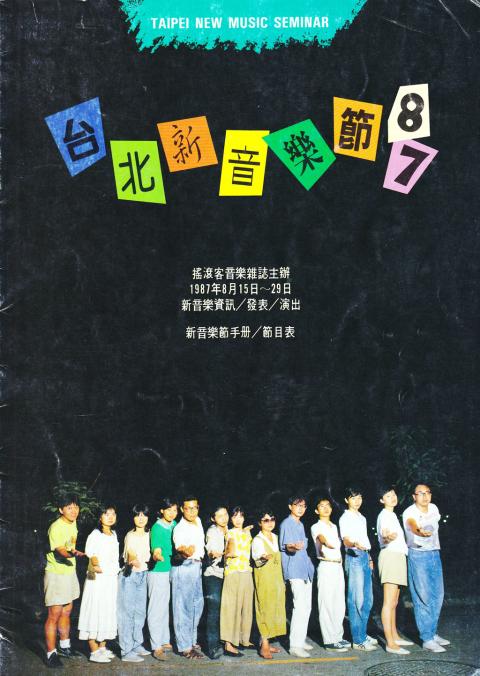
Photo courtesy of TheCube Project Space, Kaohsiung Museum of Fine Arts, MvoNTUE and Taishin Bank Foundation for Arts and Culture
Ever since the inception of TheCube Project Space (立方計畫空間), an art space Lo and Cheng co-founded in 2010, the pair have used it as a platform to carry out curatorial and research projects on Taiwan’s sound culture, a term they use to refer to all kinds of music and other audio creations, ranging from folk, rock and electronic music, to experimental sound and sound art.
The project developed through a series of lectures and exhibitions by musicians and contemporary artists and morphed into large-scale exhibitions at the Museum of National Taipei University of Education (MoNTUE, 北師美術館,) and the Kaohsiung Museum of Fine Arts (高雄市立美術館) last year. Those exhibitions received the grand prize at this year’s Taishin Arts Award (台新藝術獎).
ALTERING NATIVISM
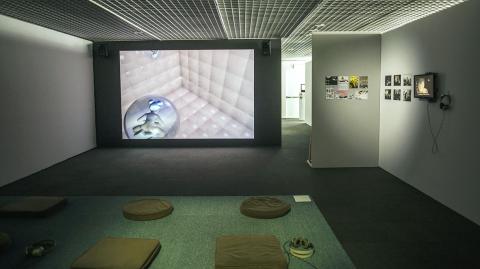
Photo courtesy of TheCube Project Space, Kaohsiung Museum of Fine Arts, MvoNTUE and Taishin Bank Foundation for Arts and Culture
Lo and Cheng say it is essential to examine this bit of history so as to identify how sound cultures have evolved and influenced society. One of the book’s key words is nativism, a term that refers to bentuhua (本土化), which can be translated as localization, Taiwanization or nativization. Lo says Taiwan, due to it being colonized many times over its history, has become a multicultural country where the identity of its people is constantly being redefined.
“Nativism means an ever-changing process through which you see and identify yourself,” Cheng says.
“Another point is to see ... how music plays an active role in facilitating such changes,” Lo adds.
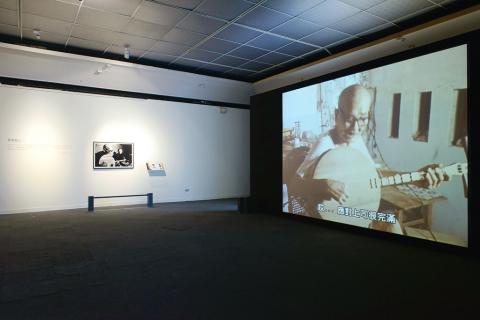
Photo courtesy of TheCube Project Space, Kaohsiung Museum of Fine Arts, MvoNTUE and Taishin Bank Foundation for Arts and Culture
The now-defunct Crystal Records (水晶唱片), opened after martial law was lifted in 1987, is recognized as an important force behind the quest for nativism. Along with a new generation of independent musicians and groups such as Chu Yueh-hsin (朱約信), Chen Ming-chang (陳明章) and Black List (黑名單工作室), the indie label initiated what has come to be known as the “New Taiwanese Music” (台灣新音樂) campaign to produce and promote alternative music, with musicians drawing inspiration from Taiwanese musical traditions to create songs in Hoklo (more commonly known as Taiwanese) that are socially and politically relevant to the new democratic reality.
“Crystal Records offers a good example of how musicians combine traditional Taiwanese songs with folk, rock and electronic music to give the traditional a new face that is meaningful and relevant to the present day,” Lo says.
ALTERNATIVE SOUNDS
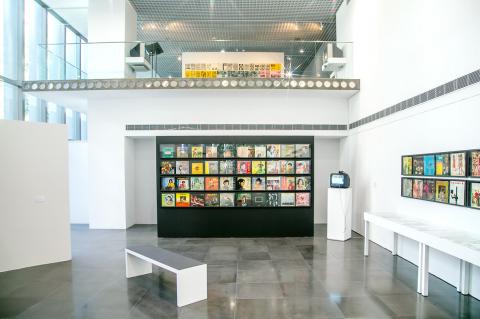
Photo courtesy of TheCube Project Space, Kaohsiung Museum of Fine Arts, MvoNTUE and Taishin Bank Foundation for Arts and Culture
A play on the word alternative, the title of the book also serves as a rallying cry for social and political activism.
Folk musicians such as Li Shuang-tze (李雙澤) and Yang Tsu-chuen (楊祖珺) were part of a thriving folk song movement (民歌運動) in the 1970s who made social activism part of their music and sang about the socially disadvantaged. But the authorities soon banned them.
Fast-forward to the 1990s, music and activism went hand in hand for protest bands like Black Hand Nakasi (黑手那卡西), which collaborated with and held workshops for the working class, and Labor Exchange (交工樂隊), which was formed by Zhong Yong-Feng (鍾永豐) and Lin Sheng-xiang (林生祥) during protests against the building of the Meinung Dam (美濃水庫) in 1992.
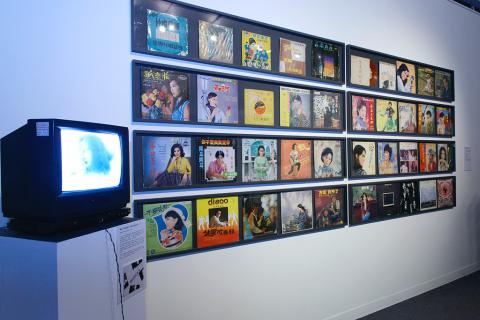
Photo courtesy of TheCube Project Space, Kaohsiung Museum of Fine Arts, MvoNTUE and Taishin Bank Foundation for Arts and Culture
The early 1990s also saw the short-lived noise movement led by LTK Commune (濁水溪公社) and Zero and Sound Liberation Organization (ZSLO, 零與聲音解放組織). In his article, sound artist Lin Chi-wei (林其蔚), a founding member of ZSLO, gives a detailed account of how, in the aftermath of the end of martial law and the Wild Lilies student movement (野百合運動), young artists, musicians and anarchists used music as a creative outlet to raise awareness about social issues.
The book includes many rare documents. A manifesto by LTK proclaims that “punks, drug dealers, queers and scumbags” should create a new social order. A flyer of the legendary Taipei Broken Life Festival (破爛生活節), which featured high-frequency noise performances and violent, provocative acts (performing colon cleansing using yoghurt and setting fire to the stage) that “forced most of the audience to flee from the scene.”
A NEW MILLENNIUM
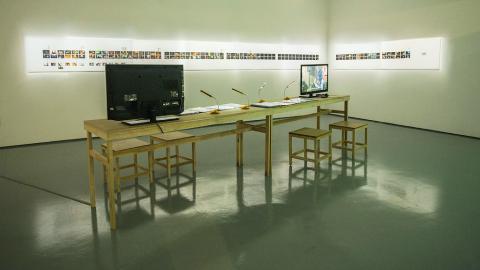
Photo courtesy of TheCube Project Space, Kaohsiung Museum of Fine Arts, MvoNTUE and Taishin Bank Foundation for Arts and Culture
ALTERing NATIVism ends in the new millennium with sound art by groups such as Lacking Sound Festival (失聲祭) and Etat (在地實驗).
Lo and Cheng say these artists are unique in the way they collaborate and form their own platforms, not only as artists and performers, but event planners, Web managers and publishers.
“In the 1990s, young people did what they did out of a sense of urgency. They [gave] the middle finger to the establishment. They didn’t organize. They were anti-institutional,” Cheng says, adding, “today’s young artists tend to organize, create their own alternative platforms and connect to the rest of the world.”
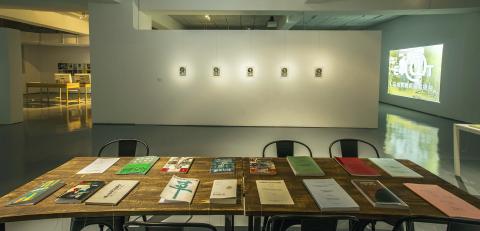
Photo courtesy of TheCube Project Space, Kaohsiung Museum of Fine Arts, MvoNTUE and Taishin Bank Foundation for Arts and Culture
ABORIGINAL POP
The book also discusses Aboriginal music — in particular, the largely unknown Aboriginal pop music.
According to academic Huang Kuo-chao (黃國超), Aboriginal pop developed and flourished outside the Han-Chinese music industry. It had a different mode of production and circulation, with pop stars and singers whose names were mostly unheard of to non-Aborigines.
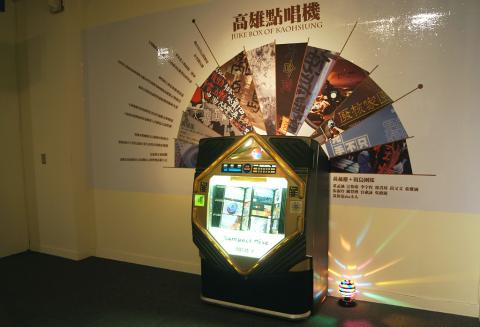
Photo courtesy of TheCube Project Space, Kaohsiung Museum of Fine Arts, MvoNTUE and Taishin Bank Foundation for Arts and Culture
“It is the alternative of the alternative,” Lo says. “This topic alone is worth writing a book about.”
A scaled-down exhibition of ALTERing NATIVism Sound Cultures in Post-war Taiwan is currently on display at MoNTUE, as part of the 13th Taishin Art Award Exhibition (第十 三屆台新藝術獎大展), which runs through July 26. The Taishin exhibition showcases five winning works, including Yuan Goang-ming’s (袁廣鳴) video art series An Uncanny Tomorrow (不舒適的明日) and Tsai Ming-liang’s (蔡明亮) theatrical work The Monk from Tang Dynasty (玄奘).
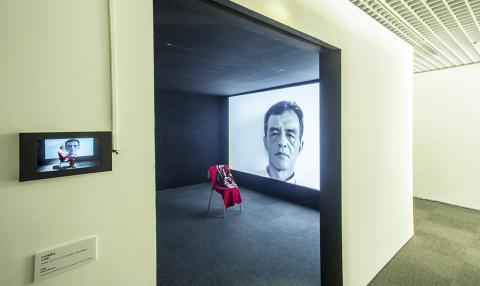
Photo courtesy of TheCube Project Space, Kaohsiung Museum of Fine Arts, MvoNTUE and Taishin Bank Foundation for Arts and Culture
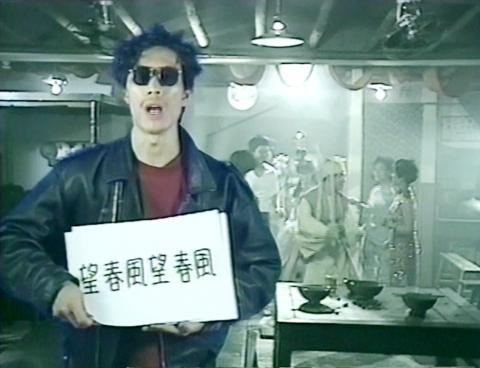
Photo courtesy of TheCube Project Space, Kaohsiung Museum of Fine Arts, MvoNTUE and Taishin Bank Foundation for Arts and Culture
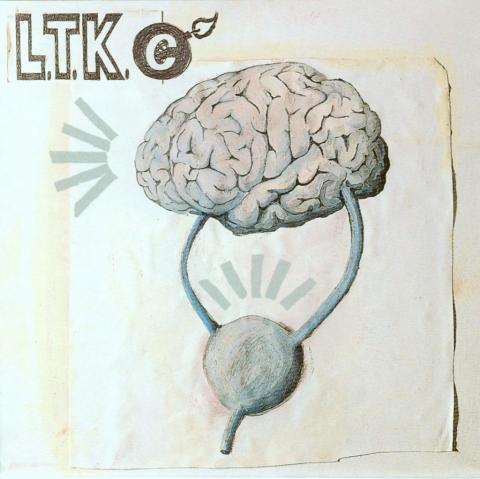
Photo courtesy of TheCube Project Space, Kaohsiung Museum of Fine Arts, MvoNTUE and Taishin Bank Foundation for Arts and Culture

Jacques Poissant’s suffering stopped the day he asked his daughter if it would be “cowardly to ask to be helped to die.” The retired Canadian insurance adviser was 93, and “was wasting away” after a long battle with prostate cancer. “He no longer had any zest for life,” Josee Poissant said. Last year her mother made the same choice at 96 when she realized she would not be getting out of hospital. She died surrounded by her children and their partners listening to the music she loved. “She was at peace. She sang until she went to sleep.” Josee Poissant remembers it as a beautiful

March 2 to March 8 Gunfire rang out along the shore of the frontline island of Lieyu (烈嶼) on a foggy afternoon on March 7, 1987. By the time it was over, about 20 unarmed Vietnamese refugees — men, women, elderly and children — were dead. They were hastily buried, followed by decades of silence. Months later, opposition politicians and journalists tried to uncover what had happened, but conflicting accounts only deepened the confusion. One version suggested that government troops had mistakenly killed their own operatives attempting to return home from Vietnam. The military maintained that the

Before the last section of the round-the-island railway was electrified, one old blue train still chugged back and forth between Pingtung County’s Fangliao (枋寮) and Taitung (台東) stations once a day. It was so slow, was so hot (it had no air conditioning) and covered such a short distance, that the low fare still failed to attract many riders. This relic of the past was finally retired when the South Link Line was fully electrified on Dec. 23, 2020. A wave of nostalgia surrounded the termination of the Ordinary Train service, as these train carriages had been in use for decades

Lori Sepich smoked for years and sometimes skipped taking her blood pressure medicine. But she never thought she’d have a heart attack. The possibility “just wasn’t registering with me,” said the 64-year-old from Memphis, Tennessee, who suffered two of them 13 years apart. She’s far from alone. More than 60 million women in the US live with cardiovascular disease, which includes heart disease as well as stroke, heart failure and atrial fibrillation. And despite the myth that heart attacks mostly strike men, women are vulnerable too. Overall in the US, 1 in 5 women dies of cardiovascular disease each year, 37,000 of them